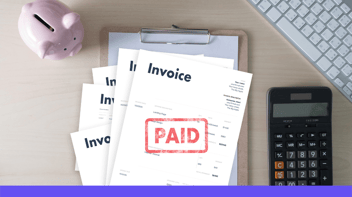10 Effective Ways to Improve Debtor Management

Debtor Management For Businesses
Businesses often struggle with managing their debtors, or accounts receivable, effectively. This means they're probably experiencing cash flow challenges, strained relationships, and they could even be missing out on opportunities for growth.
Late payments, unpaid invoices and inefficient procedures can wreak havoc on your financial health and operational efficiency. For example, ever-growing bad debt, cash flow issues and disrupted operations greatly impact budgeting, resource allocation and investment decisions.
Without a solid system or benchmarks in place, businesses also risk facing legal issues, damaged reputations, and stress levels that no business owner or leader wants.
Understanding the components of effective debtor management is crucial for maintaining financial stability, not to mention fostering good relationships with the customers who push cash in your pocket.
By adopting the right strategies and tools, you can navigate these challenges successfully and ultimately pave the way for business growth and prosperity.
In this article:
→ What is Debtor Management?
→ What Good Debtor Management Means For Your Business
→ When Should You Examine Your Debtor Management?
→ 10 Practical Ways to Improve Debtor Management
→ Key Takeaways of Best-Practice Debtor Management
Want the 10 effective ways to improve your debtor performance straight up? They are:
→ 1. Monitor the right debtor metric
→ 2. Automate your invoicing
→ 3. Clearly display payment terms
→ 4. Offer early payment incentives
→ 5. Follow up overdue invoices promptly
→ 6. Utilise your ERP or compatible software
→ 7. Evaluate your credit policies
→ 8. Have dedicated communication channels
→ 9. Do thorough credit checks
→ 10. Outsource debt collection
What is Debtor Management?
Debtor management, also known as accounts receivable management, refers to a company's approach to handling outstanding customer invoices. It involves tasks such as generating invoices, monitoring payment schedules and chasing overdue accounts.
This process plays a crucial role in keeping a business financially healthy, ensuring your cash flow is consistent and any financial risks are mitigated.
What Good Debtor Management Means For Your Business
There are many ways a solid accounts receivable approach benefits your entire business. Overall, it:
- Helps maintain steady cash flow.
- Ensures timely payment from customers.
- Minimises the risk of bad debts.
- Improves overall financial health of the business.
- Enhances credibility with your suppliers and lenders.
- Promotes better decision-making based on accurate financial data.
- Facilitates effective budgeting and planning.
- Builds stronger relationships with customers through transparent communication about payment terms.
- Reduces the need for borrowing or reliance on credit.
- Increases profitability by reducing unnecessary expenses and late payment penalties.
Ultimately, having good debtor management processes in place means you're more likely to get paid on time and have better control over your cash flow.

When Should You Examine Your Debtor Management?
Improving how your business handles its invoicing is often one of those jobs put off for a rainy day. But examining your debtor management is a genuinely worthwhile activity that's especially important during these six periods.
1. At the end of each month, quarter and year
As financial statements are prepared and reviewed at the end of each reporting period, paying attention to debtor management here is paramount. Making sure outstanding invoices are being collected promptly means your reporting will most accurately reflect the business's financial position.
2. If you have cash flow concerns
When cash flow is tight, such as when expenses are due or during slow sales months, it's a good time to look at your debtor management. This ensures that incoming cash is maximised, helping to cover operational expenses and avoid liquidity issues.
3. When budgeting and planning
Debtor management plays a significant role in budgeting and planning processes. By analysing debtor data, businesses can forecast future cash flows more accurately, identify potential shortfalls, and make informed decisions about investments, expenses and growth strategies.
4. When you need to minimise bad debt
Examining your debtor management approach allows businesses to identify and address customers with overdue payments promptly. Being proactive minimises the risk of bad debts, preserving your financial stability and profitability.
5. To foster good relationships
Collecting outstanding invoices promptly demonstrates professionalism and reliability, which fosters stronger relationships with your customers. By maintaining transparent communication about payment terms and expectations, this also enhances trust and credibility with your clients, making it more likely to garner repeat business and word-of-mouth referrals.
6. When you need to boost financial performance
Effective debtor management contributes to the overall financial health of the business by optimising cash flow, reducing reliance on credit, and mitigating financial risks. It ensures that resources are allocated efficiently, enabling sustainable growth and long-term success.

10 Practical Ways to Improve Debtor Management
By adopting the right strategies and tools, you can navigate typical debtor management challenges successfully.
Here are 10 practical ways to improve your debtor management, paving the way for sustainable growth and prosperity in your business.
1. Monitor the right debtor metric
Solely using debtor days to evaluate debtor performance fails to account for varying payment terms, and can lead to unfair comparisons between businesses.
Instead, we recommend using the percentage of your overdue debtors relative to total debtor value – what we call the overdue debtors ratio – as your team's KPI.
This shifts the focus from a time-based metric to a value-based one, giving you a more accurate understanding of your debtor management performance.
2. Automate your invoicing
Set up automated invoicing systems to streamline the invoicing process, reducing errors and freeing up human capacity.
For example, schedule invoices to be sent immediately after providing goods or services.
3. Clearly display payment terms
Make it easy for customers to understand your payment terms and their obligations.
For example, state the due date prominently on invoices and specify late payment penalties.
4. Offer early payment incentives
Offer incentives for early payment, such as discounts for invoices paid within a certain timeframe or extended credit terms for loyal customers.
5. Follow up overdue invoices promptly
Take action swiftly on overdue payments with polite yet firm reminders, in several ways.
For example, have an automated email reminder a few days before the invoice's due date, and if the due date has passed, follow up with a phone call.
6. Utilise your ERP or compatible software
Most ERP systems such as MYOB and Xero have in-built functions – or at least software that integrates with them – that help with debtor management. Familiarise yourself with these to help more easily identify overdue payments, track payment histories and generate reports.
7. Evaluate your credit policies
Regularly review and update credit policies to mitigate the risk of bad debts.
For example, consider factors such as credit limits, payment terms, and creditworthiness as assessment criteria.
8. Have dedicated communication channels
Establish effective communication channels with customers to address payment issues promptly.
For example, have a dedicated support email address or phone number where customers can reach out with any billing inquiries or payment difficulties.
9. Do thorough credit checks
Conduct thorough credit checks on new customers to assess their creditworthiness and reduce the likelihood of late payments or default.
For example, conduct your own credit reference checks or go through a third-party credit reporting agency.
10. Outsource debt collection
Businesses usually have at least one client who keeps continually pushes the boundaries when it comes to paying their invoices.
If this is a persistent issue, consider outsourcing debt collection to a professional agency. This means you can leverage their expertise in debt recovery while keeping positive relationships with your own customers.

Key Takeaways of Best-Practice Debtor Management
In conclusion, effective debtor management is essential for businesses to maintain financial stability and operational efficiency.
By implementing the right strategies and tools, such as monitoring the overdue debtors ratio, automating invoicing, and offering early payment incentives, businesses can navigate challenges successfully and pave the way for sustainable growth and prosperity.
Remember to regularly examine your debtor management processes, especially during key periods like the end of reporting periods and when cash flow concerns pop up.
By fostering good relationships with customers and minimising the risk of bad debts, businesses can enhance credibility, improve financial health, and ultimately, boost overall performance.
So, take proactive steps to refine your debtor management practices and ensure your business remains on the path to success.
Learn everything we teach our clients... for free
Join 400+ business owners & leaders who receive practical business & accounting tips, delivered free to your inbox every week. No fluff, just high-level expertise. Sign up now.



